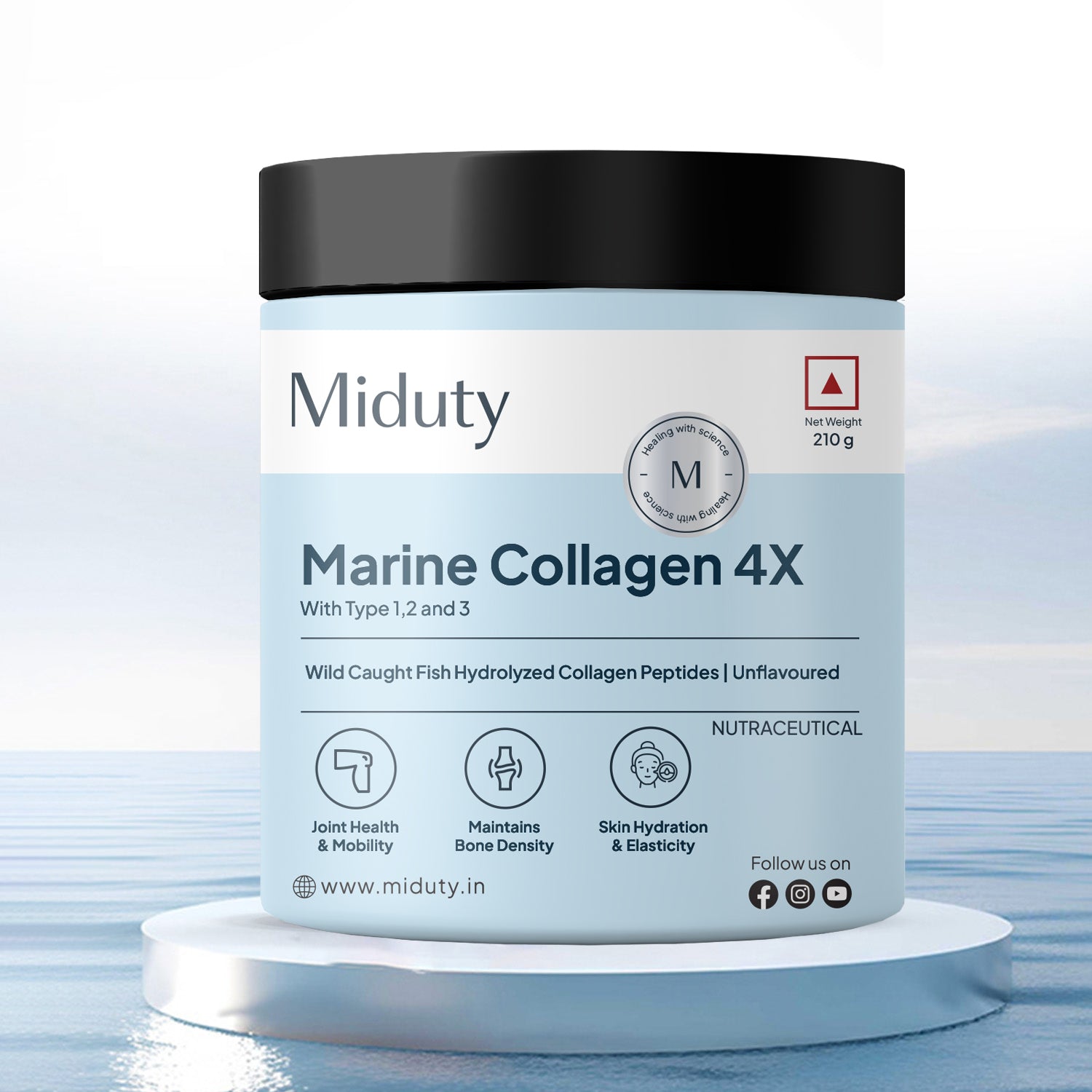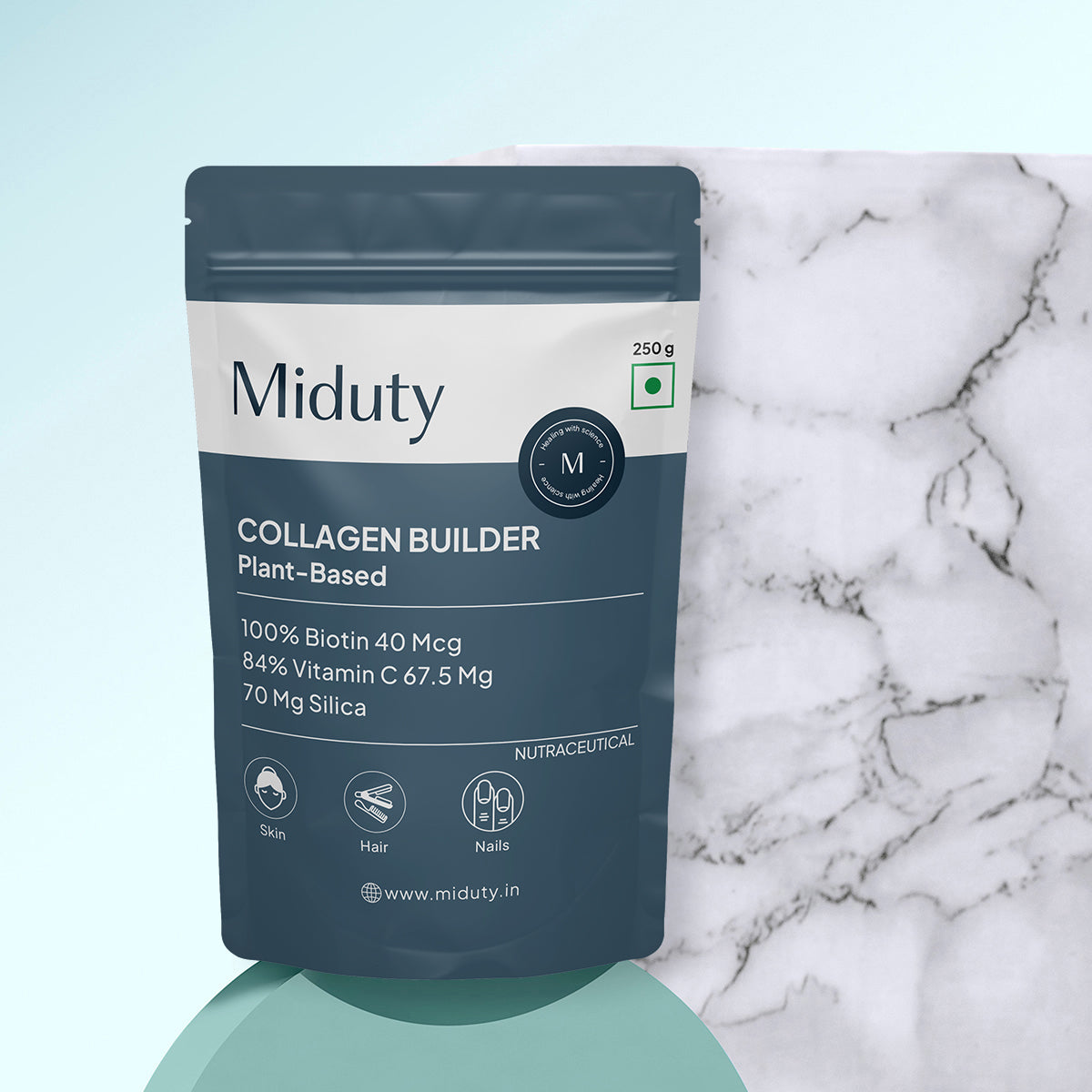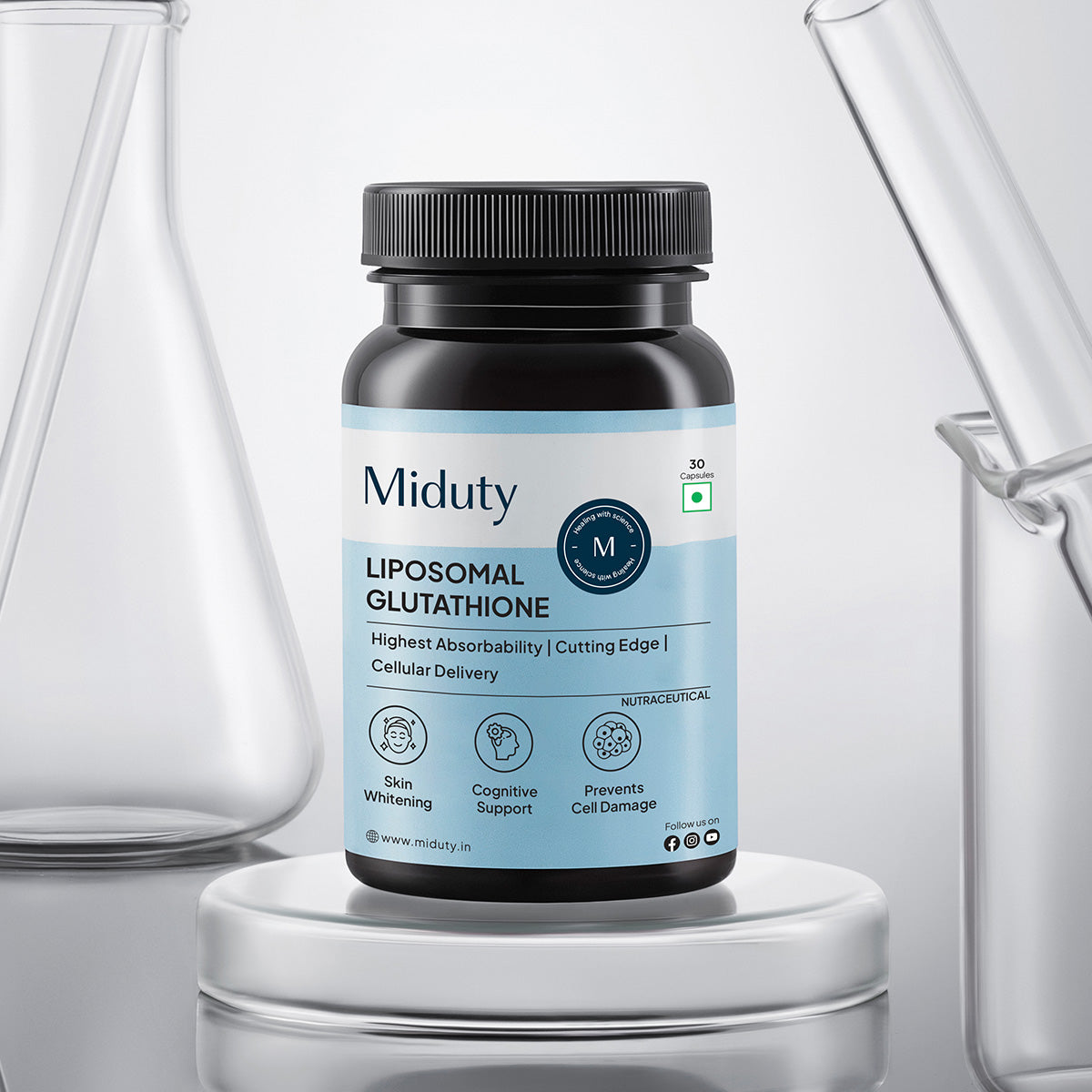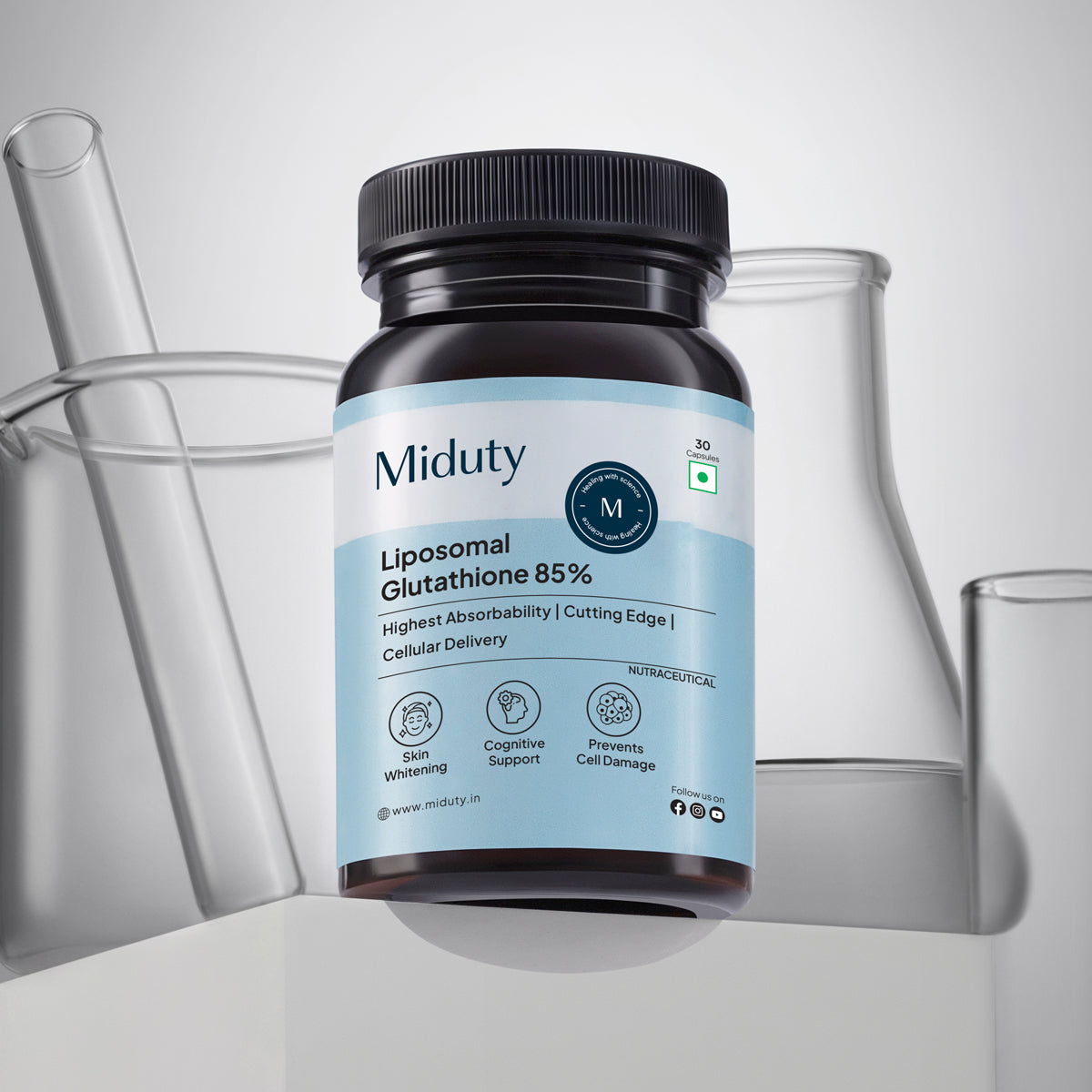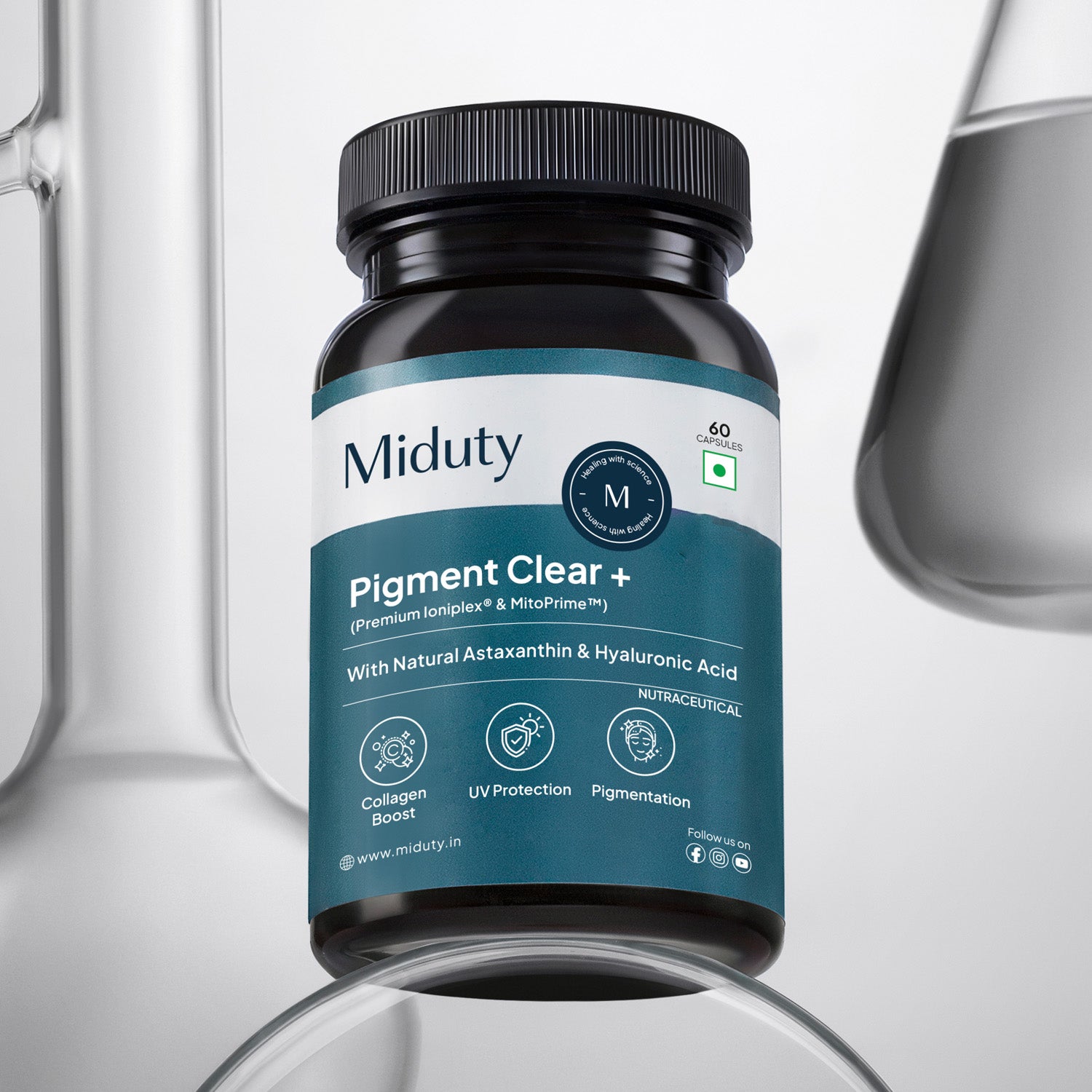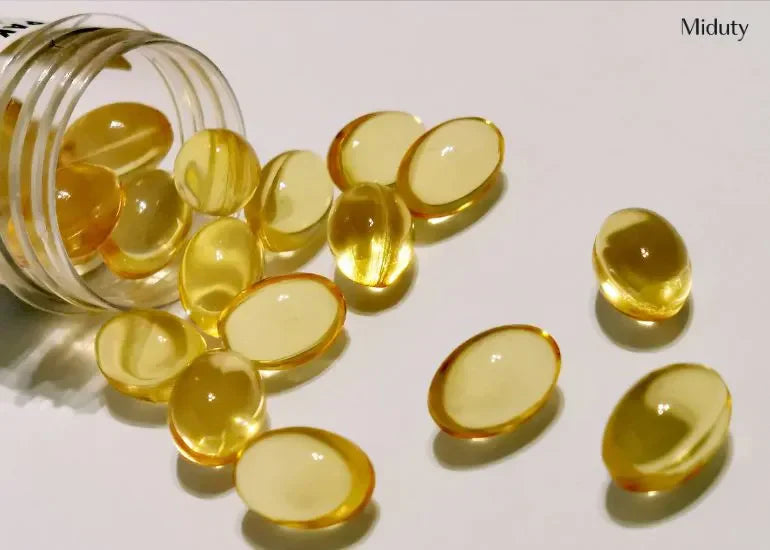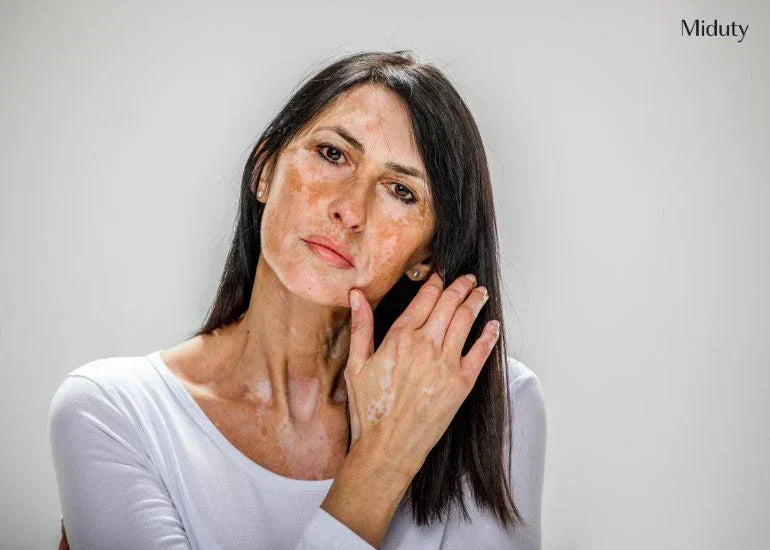
Collagen vs Glutathione: What Works Best For Skin?
Among the most talked-about nutrients for skin health are Glutathione and Collagen. But which one is better for your skin? Let's break it down.
The skincare and beauty industry today is overflowing with supplements that promise a radiant, youthful glow fr om capsules and powders to serums and shots. But among all the trending ingredients, two names consistently stand out: Glutathione and Collagen.
Both are backed by scientific research and global popularity, yet they work in completely different ways to improve your skin. Glutathione is often celebrated as the "master antioxidant" that helps detoxify the body and brighten the complexion, while Collagen is known as the "structural protein" that gives your skin its firmness, elasticity, and bounce.
But the confusion is:
Many people end up taking both without understanding which one their skin truly needs. Should you choose Glutathione for its whitening and detoxifying effects? Or should you prioritize Collagen for anti-aging and firmness? And is it even possible that your skin might benefit from both?
Understanding how each works on a cellular level helps you make smarter choices for your skincare routine and supplement strategy. So in this blog, we'll break down the science, benefits, and key differences between Glutathione and Collagen, explore what type of skin each suits best, and reveal how combining the two can actually unlock the secret to glowing, youthful, and healthy skin from the inside out.
Key Takeaways:
1. Glutathione brightens from within - It reduces dark spots, evens skin tone, and fights oxidative stress for a radiant, youthful glow.
2. Collagen strengthens your skin - It improves elasticity, hydration, and firmness, helping reduce fine lines and sagging.
3. Different goals, different benefits - Glutathione is ideal for pigmentation and detox, while Collagen targets anti-aging and structural support.
4.Visible results take time - Glutathione shows brightening in 4-6 weeks, whereas Collagen improves firmness and elasticity over 8-12 weeks.
5. Smart timing boosts results - Experts suggest taking Glutathione in the morning with Vitamin C and Collagen peptides in the evening for maximum absorption.
What is Glutathione and Why does it matter for your Skin?
Glutathione is a master antioxidant naturally produced by your body, made up of three amino acids cysteine, glutamine, and glycine. Its primary role is to neutralize free radicals and detoxify the liver, both of which are crucial for healthy skin. [1]
Every day, your skin faces invisible threats: pollution, UV radiation, processed foods, emotional stress, and toxins. These triggers release free radicals unstable molecules that damage your skin cells and accelerate aging. [2]
and your body's natural Glutathione production drops significantly. This imbalance leads to melanin overproduction, dark spots, uneven tone, and premature wrinkles. That's when supplementing Glutathione can make a real difference.
Benefits of Glutathione for Skin
1. Fights Oxidative Stress
Every day, your body is exposed to oxidative stress caused by pollution, UV radiation, unhealthy foods, and even emotional stress. These triggers release free radicals that attack your skin cells and break down collagen fibers. Glutathione works as a frontline antioxidant, neutralizing these unstable molecules before they cause cellular damage. This protection helps maintain skin elasticity, prevents premature wrinkles, and keeps your complexion looking fresh and youthful.
2. Skin Brightening
Glutathione can brighten and even out the skin tone. This natural antioxidant works at the cellular level by inhibiting the enzyme tyrosinase, which is responsible for melanin production, the pigment that gives skin its color. By slowing down the activity of tyrosinase, Glutathione effectively reduces the formation of excess melanin, particularly the darker type known as eumelanin, and encourages the production of lighter pheomelanin. This process results in a visibly lighter, more radiant, and evenly toned complexion over time. Additionally, Glutathione also combats oxidative stress and environmental damage that contribute to dullness and discoloration, giving the skin a natural glow from within.
3. Anti-Aging Effects
Glutathione's powerful antioxidant action makes it one of the most effective natural compounds in slowing down visible signs of aging. Every day, our skin is exposed to environmental aggressors such as UV rays, pollution, and stress, all of which produce free radicals. These unstable molecules attack healthy skin cells, DNA, and structural proteins, such as collagen and elastin. These free radicals accelerate the breakdown of these essential fibers, leading to wrinkles, fine lines, and sagging skin. Glutathione works as a cellular protector, neutralizing free radicals before they can cause oxidative damage, and maintaining the delicate balance between oxidation and reduction within skin cells.
Moreover, Glutathione supports the preservation of collagen integrity and protects fibroblast cells, the skin's collagen-producing factories, from oxidative stress. This ensures that the skin maintains its elasticity, smoothness, and youthful bounce for longer. What makes Glutathione even more powerful is its ability to regenerate other antioxidants, such as Vitamin E and C, which further strengthen the skin's defense against aging and environmental stress.
What is Collagen and why does it matter for your skin?
Collagen is often called the "foundation of youthful skin". It is the most abundant protein in the human body, accounting for nearly 30% of your total protein mass. Structurally, it acts as the scaffolding or framework that holds your skin, bones, muscles, tendons, and ligaments together. [3] [4]
In the context of skincare, collagen gives your skin its firmness, plumpness, and smooth texture. But when it starts to thin or break down, wrinkles, sagging, and fine lines begin to appear.
Your body naturally produces collagen, but this production starts to decline after the age of 25 by about 1-1.5% every year. This slow but steady decrease is accelerated by sun exposure, stress, poor diet, smoking, pollution, and lack of sleep. Over time, your skin begins to lose its structural support, leading to visible signs of aging.
That's where collagen supplements, especially hydrolyzed collagen or collagen peptides, come into play. These are broken-down, easily absorbable forms of collagen that help replenish what your body is gradually losing.
A recent meta‑analysis (2024) found that oral collagen supplements increased skin hydration (SMD 1.25) and elasticity (SMD 0.61), with a common dose of 4 g/day. [5]
Research in Nutrients (2019) highlighted that collagen peptide supplementation improved skin elasticity, hydration, and dermal collagen density in participants aged 35-55.
Benefits of Collagen for Skin
1. Improves Skin Elasticity
Collagen is responsible for maintaining your skin's elasticity and firmness. When collagen fibers are strong and abundant, your skin can stretch and bounce back easily, giving it that supple, youthful texture. As collagen declines, your skin becomes thinner and less resilient, which makes sagging and wrinkles more prominent. Supplementing with collagen peptides stimulates your body's fibroblasts, the cells that produce new collagen to rebuild and tighten the skin from within.
Research in Nutrients (2019) highlighted that collagen peptide supplementation improved skin elasticity, hydration, and dermal collagen density in participants aged 35-55.
2. Reduces Wrinkles and Fine Lines
Aging and environmental damage break down collagen fibers, creating gaps in the skin's structure that appear as fine lines and wrinkles. Collagen supplementation fills these gaps by enhancing dermal density and boosting collagen synthesis. Over time, this leads to smoother skin, a reduction in visible wrinkles, and a more refined skin texture. Clinical studies show that consistent collagen intake can reduce wrinkle depth and roughness, especially around the eyes and mouth, where signs of aging appear first.
A 12-week study showed that taking a hydrolysed collagen and vitamin C supplement (Absolute Collagen) daily or every other day improved skin and hair health. Collagen in the skin became 44.6% less fragmented, skin hydration went up by 13.8%, elasticity improved by 22.7%, and wrinkles reduced by 19.6%. Hair also looked healthier, with a 27.6% increase in total hair and a 31.9% boost in overall hair appearance. [6]
3. Hydrates Skin from Within
Collagen has a unique ability to improve skin hydration by increasing the skin's natural water-binding capacity. Collagen peptides stimulate the production of hyaluronic acid, another compound responsible for skin hydration and plumpness. As a result, your skin appears dewier, smoother, and more radiant, with a noticeable improvement in its moisture barrier and softness. [7]
Glutathione vs Collagen: Key Differences
|
Feature |
Glutathione |
Collagen |
|
Primary function |
Antioxidant, detoxifier, skin brightener |
Structural protein, skin elasticity, hydration |
|
Best for |
Hyperpigmentation, dullness, and anti-aging at the cellular level |
Wrinkles, sagging, hydration, firmness |
|
Source |
Naturally in the liver; supplements are available orally or in liposomal forms |
Bone broth, marine collagen, bovine collagen, hydrolyzed collagen powders |
|
Time to see results |
4-6 weeks for brightening and glow |
8-12 weeks for firmness and elasticity |
|
Complementary use |
Can be used alongside collagen for maximum effect |
Works best when paired with antioxidants like Glutathione |
How Collagen and Glutathione Work for Different Skin Concerns?
If you have the following skin concerns, here's what can help.
1. Dull Skin & Uneven Tone
- How Glutathione Helps: Inhibits melanin production, brightens complexion
- How Collagen Helps: Indirectly supports healthy skin structure
2. Fine Lines & Wrinkles
- How Glutathione Helps: Reduces oxidative stress that accelerates aging
- How Collagen Helps: Provides structural support to minimize wrinkles
3. Loss of Elasticity & Sagging
- How Glutathione Helps: Helps maintain cellular health
- How Collagen Helps: Directly improves elasticity & firmness
4. Acne & Pigmentation
- How Glutathione Helps: Anti-inflammatory, detoxifying effect
- How Collagen Helps: Limited effect
5. Dryness & Hydration
- How Glutathione Helps: Supports skin cell repair
- How Collagen Helps: Helps retain moisture and improve skin texture
Collagen vs Glutathione: Which is Better for Skin?
Neither is strictly "better" in absolute terms; it depends on your skin concern, your lifestyle, and your realistic expectations. Here's a breakdown to help you choose.
When Collagen might be the better priority:
- You notice skin sagging, loss of firmness, fine lines, "empty" look under cheeks, and less bounce.
- You are > 30 yrs (especially >40) and want to support skin structure from within.
- Your diet may be low in proteins/amino acids, or you have aesthetic/photo‑aged skin.
- Your skin routine already includes sun‑protection, antioxidants, and you want to add structural support.
When Glutathione might be the better priority:
- You have uneven tone, dark spots, post‑acne pigmentation, sun‑damaged skin, and a dull complexion.
- You are concerned with brightness, clarity, and even tone, and want a more radiant look.
- You live in a high‑pollution/UV environment (like many Indian metros), and have lifestyle stress.
- Your main struggle is with pigmentation, and you've tried many topical bleaches/serums with limited success.
Here's an Expert Tip
- Take Glutathione in the morning (on an empty stomach with Vitamin C).
- Take Collagen peptides in the evening (preferably hydrolyzed, with warm water).
- Stay consistent for at least 8-12 weeks to see a visible transformation.
Conclusion
The debate of Glutathione vs Collagen isn't about choosing one over the other; it's about understanding what your skin truly needs. If your primary goal is skin brightening and detox, Glutathione is the star. If you want firmness, bounce, and anti-aging, Collagen takes the lead. And if you want both? Their synergy creates magic inside and out. Your skin reflects your internal health, and these two nutrients together represent the ultimate inside-out beauty approach.
FAQ's on Collagen vs Glutathione for Skin
Q1. Can you take collagen and glutathione together?
Yes, you can safely take Glutathione and Collagen together as they complement each other. Glutathione brightens and protects the skin from oxidative damage, while Collagen enhances elasticity, firmness, and hydration. Their combined use promotes healthier, youthful, and more radiant skin from within.
Q2. Is collagen good for skin whitening?
Collagen doesn't whiten skin, but it improves skin health by enhancing hydration, elasticity, and firmness. This leads to a naturally brighter, smoother, and more radiant complexion.
Q3. Which is better, glutathione or collagen?
Neither Glutathione nor Collagen is strictly better; they serve different purposes. Collagen enhances skin firmness, hydration, and elasticity, while Glutathione brightens the skin and reduces pigmentation by fighting oxidative stress. Your choice depends on your specific skin goals.
Q4. Does glutathione whiten skin?
Yes, Glutathione brightens the skin by reducing melanin production, helping diminish dark spots and uneven tone. While it doesn't alter natural skin color, it promotes a more radiant, even, and luminous complexion, with results varying by individual and method of use.
Q5. How long does collagen take to clear skin?
Collagen typically shows initial improvements in skin hydration within 3-4 weeks of consistent use. Noticeable benefits like improved elasticity, reduced wrinkles, and smoother skin usually appear after 8-12 weeks, with maximum results around 16 weeks or more.
References


